STORY: “Monarchs” by John Jodzio
Read an original short story by the summer 2008 miniStories Grand Prize-winner, John Jodzio. It's a tale of fathers and sons, the perils of young love and even younger nephews, and the joys of a little deviant behavior.
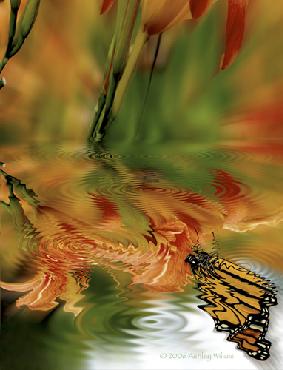
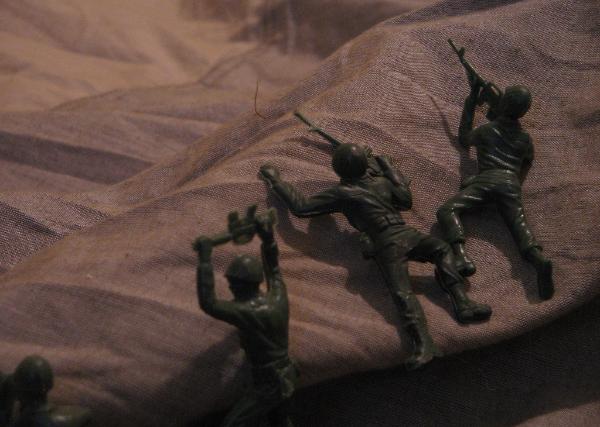
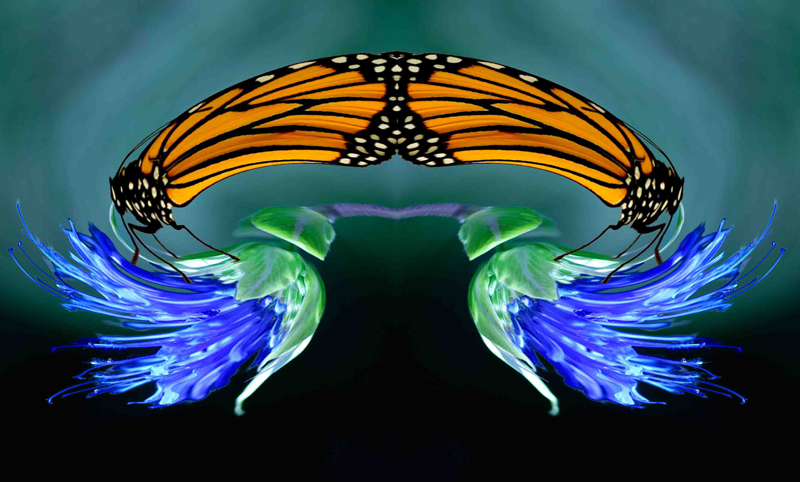
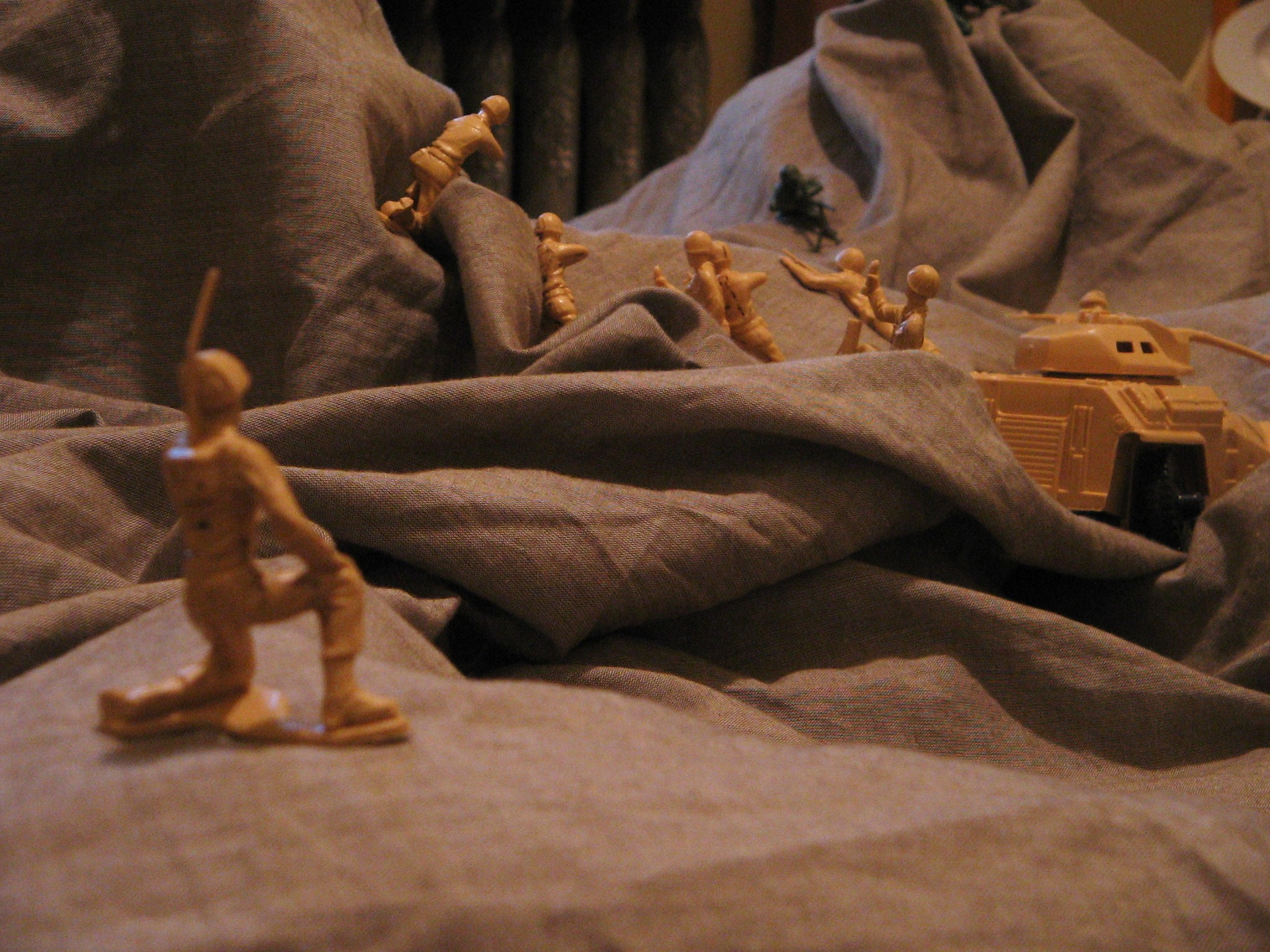

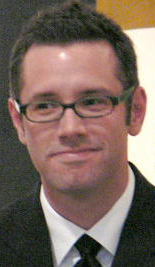
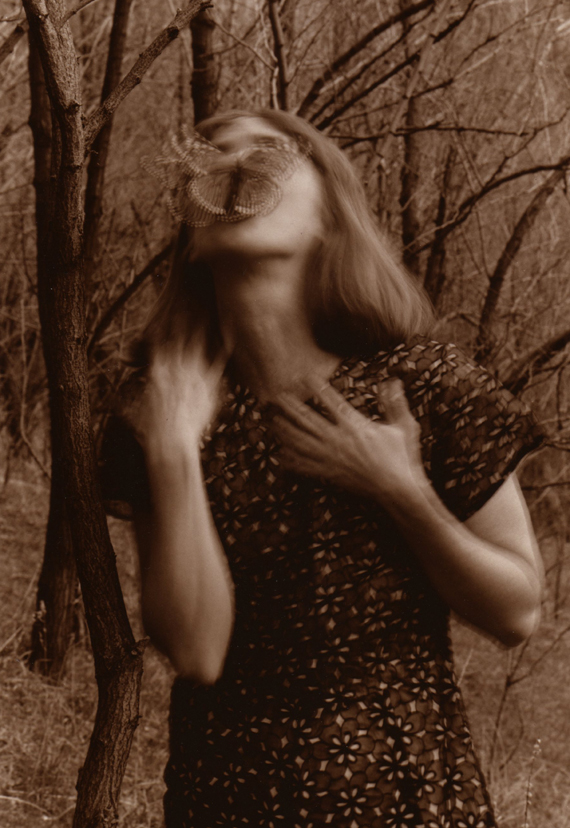
I TOLD CARMEN I HAD A SURPRISE FOR HER. We were at Manny’s Good Time, and she was lit on gin and juice. She was acting like a little kid, calling me Ricky in this high, squeaky voice. She was sitting on my lap, and she had her skinny arms draped around my neck.
“Tell me what it is, Ricky,” she said. “Tell me, tell me, tell me.”
It was a happy hour and I breathed it all in. There were two-for-ones and free hot wings and Darlene, Manny’s wife, was calling out numbers for the meat raffle.
“I can’t tell you,” I told Carmen. “It’s a surprise.”
While we sat there, Carmen’s long hair slid in front of my face. It smelled like apricots. I’d asked her about it once, hoping it was genetic, hoping that it could survive all the bar smoke and beer swill, but she told me that it was just her half-sister’s shampoo.
“C’mon,” she begged. “Just give me a hint.”
I looked Carmen up and down. She was my totally my type—too scrawny to have hips, long dark hair, mouth held in a constant sneer.
“You need to learn some patience,” I teased. “That’s what you need to learn.”
Carmen was wearing this low-cut, black dress and her hair was pulled back into a ponytail. Her skin was nut brown from sitting by the pool at her half-sister, Jennie’s, apartment complex.
I jammed a couple bucks into the jukebox, and I led Carmen over near the pool tables. It wasn’t really a dance floor, just a spot where the carpet ended, but I pulled her close and twirled her around and around.
“Please,” she whispered into my ear.
“Nope,” I said.
The next morning, I opened the door of my apartment and Carmen rushed past me and ran into my bathroom. She slammed the door and I heard her start gagging.
“Hey?” I asked. “You sick?”
After a minute of dry heaving, the door creaked open. I looked through the crack and saw Carmen slumped over the toilet. Her left hand had gathered up most of her excellent-smelling hair, but there were a couple of loose strands hovering dangerously close to the porcelain.
“There’s something stuck,” she said. “There’s something stuck in my throat, and I can’t get it out.”
Carmen was younger than me, mid-twenties, but she was fragile. I’d met her two months ago and that first night—when she barely knew me—she told me to take my finger and press down on her arm.
“Why?” I asked.
“Just do it,” she said.
The next time I saw her at Manny’s, a couple nights later, she showed me the bruise. I had hardly even touched her, but there on her forearm was my fingerprint.
“If you wanted,” she told me, “you could do your initials. Or spell out your entire name. Whatever you wanted.”
Now Carmen stood in front of my bathroom mirror staring down her throat. She stayed over at my place a couple nights a week now. I’d cleared out a drawer in my dresser, and she’d brought over a duffel bag with some clothes. This was as far as I’d gotten with a woman in a long time. I knew I should savor it, that it was only a matter of time before I did something to drive her away.
“After you dropped me off, I fell asleep on Jennie’s couch,” she said. “This morning I woke up to my little nephew shoving an army man into my mouth.”
I went into the kitchen and found a flashlight and pointed it down Carmen’s throat. My face was right near her mouth. Whenever she exhaled, there was this annoying sound—like a radiator that needed to be bled.
“Feel right here,” she told me.
I put my hand on her throat, felt her swallow. There was something big rattling around in her neck. It could have been just about anything. A wristwatch? Legos? An entire battalion of army men? Who knew what her nephew had found on the floor of that ratty apartment and shoved into her mouth?
“I can’t see anything,” I told her. “But there’s definitely something there.”
She turned on the faucet, made a cup with her hands, took a drink.
“Do you want me to take you to the hospital?” I asked.
“No way,” she said. She leaned against the sink, ran her hand over her throat, swallowed, then winced. “You said I get a surprise. And I want my goddamn surprise.”
The surprise I had for Carmen was that we were driving up North to my father’s Monarch farm. People needed butterflies for weddings, to christen their babies, for graduation parties. My father was happy to provide this service. He charged five hundred bucks a pop for those ten seconds he let the butterflies go, and the sky turned orange in your honor.
_________________________________________________
I put my hand on her throat, felt her swallow. There was something big rattling
around in her neck. It could have been just about anything. A wristwatch? Legos?
An entire battalion of army men? Who knew what her nephew had found on the floor
of that ratty apartment and shoved into her mouth?
_________________________________________________
Every year during the first weekend in September, my father went on this trip to visit our relatives in Atlanta. Even though he didn’t really trust me, he was too cheap to pay for real help. He gave me a hundred bucks plus gas to look after his place for the weekend.
“Same deal as last time,” he told me when he called. “You drive up on Saturday morning, ride back on Sunday morning. That’s it. No funny business.”
Taking care of the butterflies wasn’t difficult. Mostly you drank and watched TV. The only thing you ever had to do was turn on the heating lamps if it got too cold.
“Don’t be afraid to use those heaters,” my father reminded me for the millionth time when he’d called. “There’s no shame in using the heaters. No shame at all.”
All of the Monarchs were housed in this concrete building out in the back of his house. There were tens of thousands of them in there, making their way through their lifecycle, from birth to death, but my dad would bitch about even one of them dying. He was petty like that. Once he lectured me for about an hour when he saw that I had accidentally crushed one in the door frame.
“They’re frail,” he said. “The slightest touch on their wings and they start flying around in a circle and can’t stop. It’s horrible to watch.”
My father and I went for months at a time without speaking, but whenever he called me in the last few years, the only thing he talked about was Monarchs. He told me stats about their migration, tidbits about their place in history, about the things he did to help his pupa production. I suppose this was his attempt to get me more invested, to make me a better caretaker, but I hardly listened.
“They’re an aphrodisiac,” he told me. “Henry VIII used to put a butterfly right on the top of his steak.”
My father was totally obsessed. It was unhealthy. My mother had left him a long time ago and I was a big disappointment. This was the only thing he had now. These butterflies.
I looked at Carmen as I drove. Her face looked ashen. She kept taking her hands and moving them up and down her throat, trying to figure out what was in there. She pulled this crusty blanket out of the backseat and wrapped it around her shoulders. It was pretty hot out, but she was shivering.
I put my hand on Carmen’s knee and squeezed. She was not the first woman I had brought up to my father’s place. There were a couple others too. There was this waitress who worked at the Steak ‘n’ Ale. A girl named Rain who I’d met at the downtown library.
Considering what had happened last time I’d come up here, I was actually surprised that my father had asked me to housesit again. Last time, he’d found a couple of candles inside the shed. Nothing had caught on fire, none of his precious butterflies had gotten hurt, but he wouldn’t let it rest.
“This isn’t a place for you to fuck,” he told me.
But it so was. My dad never used it for that, but he should have, because when you stripped naked and laid down on the floor in the shed, butterflies floated down and landed all over your naked body. It was incredible, like a million tiny lips kissing you all at once. It was insane being in there alone, but with another person to share it with, the experience was absolutely mind-blowing.
“I need to be able to trust my son,” my father told me on the phone. “I need him to understand that my butterflies are not his sex slaves. I need him to understand that they have the same delicate psyches as human beings, and they do not like to be involved in your deviant behavior.”
“Absolutely,” I told him.
I heard him take a deep breath and then blow it out. I’d recently lost a job managing a copy shop that he’d lined up for me, and before that I’d gotten fired from his fishing buddy’s car dealership. I doubted that he’d stick his neck out for me much longer, that I’d just about ruined whatever goodwill had been passed on just from being his son.
“I need you to be responsible,” he said.
I knew it was wrong, but as I talked with my father I was already thinking about asking Carmen to come with me. I couldn’t help myself. Those butterflies landing on you felt good enough to be disowned.
“I’m your guy,” I said.
When I put on the blinker to my dad’s house, Carmen’s face dropped. There wasn’t a lake, there was no carnival, there was not a string quartet standing there in the driveway. My father lived in a brown rambler and, other than the butterfly shed, the property had pretty much gone to hell. Next to the house sat a rusted-out school bus that was sort of listing off to one side.
_________________________________________________
When I put on the blinker to my dad’s house, Carmen’s face dropped.
There wasn’t a lake, there was no carnival, there was not a string quartet
standing there in the driveway. “This is a place you bring someone to kill them,” she said. “Is that the surprise? That you’ve brought me here to die?”
_________________________________________________
“This is a place you bring someone to kill them,” she said. “Is that the surprise? That you’ve brought me here to die?”
We got out of the car and walked back to the shed. The whistling in Carmen’s throat had moved up an octave. I started talking like a carnival barker now, trying to create excitement where there was none.
“There are a million butterflies in there,” I explained.
“So what?” Carmen said.
“Have you ever gotten naked and had a million butterflies land on you at once?” I asked her. “It is like being kissed by God. You can’t even imagine.”
I grabbed onto Carmen’s hand, but she pulled it away from me, curled it up into a fist.
“This isn’t a surprise,” she said. “This is fucked.”
When we got inside the house, Carmen locked herself in the bathroom. She sat inside there for the two hours. I sat in the basement and watched television until I heard her footsteps upstairs. I found her standing in front of the fridge, holding a picture of my father in her hand. The picture was from a fishing trip a couple of years ago. He was passed out in a hotel bed. Someone had stuck one of those Burger King crowns on his head and drawn a curly mustache on his face in black marker. I wondered if Carmen was going to say that he looked like me. The fact was we did look a lot alike; even with the moustache and the crown it was hard not to notice the resemblance.
“Whose place is this?” she asked.
“It’s a friend of mine,” I told her. “I help him out sometimes.”
I opened up the fridge, took out a beer and popped it open. I took a pull and passed it to Carmen. She took a drink, grimaced as she swallowed. I opened another one and downed it and then popped open another one and downed that one too. Then I went into the cabinet and found a candle and a pack of matches.
“Just c’mon,” I said. “I promise you’ll like it.”
I walked outside. Carmen followed a few steps behind. I grabbed the pad off a chaise lounge and dragged it behind me into the shed. For a while, coming in from the outside light, I couldn’t see anything. I felt the humid air on my face, heard the massive fluttering of wings above my head. I threw down the pad from the chaise lounge on the floor, lit the candle. In a minute or two, Carmen walked inside, looking sheepish.
“They fly to the ceiling when someone comes in,” I told her. “They come down once they get used to us.”
I held the candle up near Carmen’s face, to try to get an idea of her mood. She was staring up at the ceiling. She didn’t look that angry any more and so I moved behind her and started rubbing her shoulders. She let out a small breath and then turned toward me.
“Fine,” she said. “I’m game.”
She pulled my shirt over my head. She kicked off her shoes then stepped out of her shorts. I unbuttoned her shirt.
We started to kiss, but I felt Carmen’s body tense up. She pulled away, began to cough.
“Give me a second,” she said.
She put her hand to her throat and she coughed again. I watched as her eyes rolled back in her head and she fell to the floor.
For a second, I thought Carmen was messing with me. I thought that she was pissed at me for bringing her here. I thought that this was her revenge, getting me excited and then pretending to pass out. When I got down on my knees and put my ears to her mouth, I realized she wasn’t joking. There was a thin line of drool coming from the side of her mouth and she wasn’t breathing.
I lifted her up and carried her outside. I took my hands and put them under her ribcage and pulled up. Nothing. She felt cold. Her skin looked grey. I did it again. Her apricot-smelling hair was in my face and I brushed it away and then I pressed into her ribs again. The third time I did it something flew out of her throat.
I carried her over to the picnic table, set her down. She was shaking. I got a glass of water and a blanket from the house, pressed it around her. She pointed to the grass. There was this plastic ring with a big red fake jewel in it.
“That’s what it was,” she said.
We sat there stunned, holding each other. I kept asking her if she was alright and she kept telling me that she was fine. She was rubbing her throat and I was trying to come down from the adrenaline rush that someone nearly dying always gives you.
“Look,” she said to me then, pointing at the sky. “Look at that.”
I looked up. The sky was orange, the Monarchs were spilling out of the shed.
“Whoa,” Carmen said. “Damn.”
I ran over to close the door, but when I got there, I realized that there was no point in trying to stop what was already in motion. I sat down in the grass. I watched the butterflies make their way south. I knew my father was done speaking to me, regardless of what happened now. All I had left was Carmen, and so I went and found the toy ring in the grass. I walked over and knelt down in front of her. Before I could even get the words out of my mouth, before I could tell her how I felt, about how I thought what had happened was a sign that we should spend the rest of our lives together, Carmen took off running. This was not what I expected, but it was also exactly what I expected, exactly what she should have done.
“Wait!” I yelled. “Hold on!”
I watched her as she ran across the lawn. She was beautiful. The blanket that she held billowed out around her, made her look like she was floating away.
About the author: John Jodzio‘s writing has appeared in the Rake Magazine, Florida Review, Opium and in a number of places online, including McSweeney’s and Pindeldyboz. He’s won a Minnesota Magazine fiction prize and the Opium 500 Word Memoir competition and was recently awarded a Minnesota State Arts Board grant to finish a collection of short stories titled If You Lived Here, You’d Already Be Home. The flash fiction which earned him the miniStories Grand Prize for this quarter is Shoo, Shoo, and you can read it on mnartists.org.
About the series: miniStories is mnartists.org’s quarterly flash fiction competition. This new literary series is coordinated by Electric Arc Radio’s Geoff Herbach (author of newly released novel, The Miracle Letters of T. Rimburg, published by Three Rivers Press), and it showcases previously unpublished short stories by Minnesota writers. These winning short-short stories are selected by authors, editors, and publishing industry veterans from across the country. Winning miniStories will be published on mnartists.org and in the e-magazine access+ENGAGE. One grand-prize winning author will be selected from each quarter’s miniStories winners by series coordinator Geoff Herbach; the grand-prize winning author will receive a paid commission for a longer-form short story which will be published on mnartists.org.
There will be readings at the Ritz Theater in Minneapolis at the end of each quarter’s contest cycle, at which miniStories winners and judges will read their fiction. Mark your calendars: our next live reading is scheduled for Monday, October 27 at 7 pm. An audio anthology collecting the inaugural year’s miniStories winning fiction will be produced in April 2009.
CLICK HERE to read the September 2008 batch of winning miniStories or CLICK HERE to read all the previously winning flash fiction from this year in the miniStories archive.